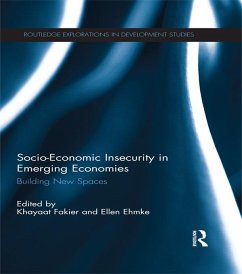Taking a unique comparative approach to the respective development paths of India, Brazil and South Africa (IBSA), this book shows that people and governments in all three countries are faced with similar challenges of heightened insecurity, caused by liberalization and structural adjustment. The ways in which governments, as well as individuals and worker organisations in IBSA have responded to these challenges are at the core of this book. The book explores the nature of insecurity in the Global South; the nature of the responses to this insecurity on public and small-scale collective as well as individual level; the potential of these responses to be more than neo-liberal mechanisms to govern and contain the poor and lessons to be learnt from these three countries.
Dieser Download kann aus rechtlichen Gründen nur mit Rechnungsadresse in A, B, BG, CY, CZ, D, DK, EW, E, FIN, F, GR, HR, H, IRL, I, LT, L, LR, M, NL, PL, P, R, S, SLO, SK ausgeliefert werden.

